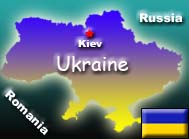New centrist coalition in Ukraine, parliament takes up crisis bills
 Kiev - Ukraine's parliament formed a new ruling coalition on Tuesday, allowing the legislature to take up long-stalled legislation for stimulating the economy.
Kiev - Ukraine's parliament formed a new ruling coalition on Tuesday, allowing the legislature to take up long-stalled legislation for stimulating the economy.
Leaders of three centrist parties, the senior Block of Yulia Tymoshenko (BYut), Our Ukraine National Defence (OUND) and the junior Block of Litvin (BL) signed the coalition agreement, giving parliament its first ruling majority since September.
The house moved quickly to take up legislation aimed at lessening the impact of the world financial crisis on Ukraine's slumping economy, accepting for debate bills on social welfare hikes, company bankruptcy protection, and naming a new parliament representative to the supreme court.
Introduction of any legislation into the house had been practically impossible for months, with MPs of warring factions destroying voting equipment and even punching each other, to prevent new laws from coming to the floor for consideration.
It was not clear precisely how many votes the new three-party majority controlled as some members from the OUND, technically led by President Viktor Yushchenko, had split off and declared themselves independents, rather than join in the coalition.
The three votes taken on Tuesday passed with a solid margin, debate on the bankruptcy bill for instance being approved by 250 votes out of the 450-seat house. The previous ruling majority before its failure in September had controlled - at best - 228 seats.
A statement from Yushchenko's office called on the new coalition to "move quickly" to pass economics legislation, particularly a new version of the 2009 national budget taking into account unexpected plummeting government revenues and general economic contraction.
Inflation in Ukraine is running at a 22 per cent annual pace, giving the former Soviet republic one of the worst inflation rates in Europe, according to a Tuesday report made public by the State Statistics Committee.
Overall economic contraction is also setting Ukrainian records, with manufacturing in the former Soviet republic shrinking by 12 per cent in November alone, the worst rate since 1993, according to the report.
An impending conflict with Russia over natural gas pricing is a second looming problem, as the current import contract between Kiev and Moscow for the fuel is scheduled to run out at the end of the year.
A failure by Ukraine's and Russia's government to reach agreement on natural gas prices in 2006 led to a two-day cut of Russian natural gas shipped to Europe, spiking fuel prices as far away as Spain. (dpa)